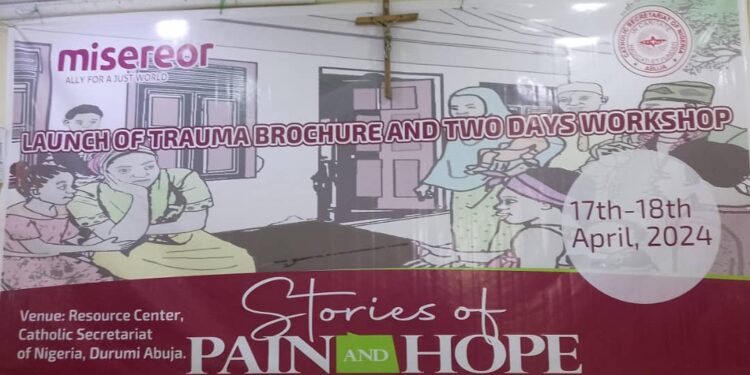By Samson Adeyanju
A coalition of faith-based and Civil Society Organisations (CSOs) has called for the enforcement of laws against all forms of Gender-Based Violence (GBV) and the swift and just prosecution of perpetrators.
The stakeholders made the call in Abuja today at the inauguration of a brochure on trauma identification and management titled, “Stories of Pain and Hope,” produced by Misereor Dialogue and Partnership Service (Misereor-DSP), a German faith-based organisation, in collaboration with its partners.
Mrs Mabel Ade, the Executive Director of Adinya Arise Foundation (AAF), highlighted that traditional and cultural dynamics, combined with gender-based violence, create a complex web that perpetuates the cycle of abuse and oppression.
She emphasized that practices such as child marriage, female genital mutilation, and bride price reinforce the subjugation of women and perpetuate their vulnerability to violence.
Adinya demanded the immediate return of the remaining Chibok girls, as well as the last of the Dapchi girls, Leah Sharibu, who is still in custody of terrorists, among others.
She stressed that when laws fail to adequately protect survivors and hold perpetrators accountable, they effectively condone and perpetuate gender-based violence.
She called on all Nigerians to demand that the government prioritise the safety and well-being of citizens, particularly women and girls.
Ms Julia Kroja, the Head of Misereor-DSP, highlighted that trauma-sensitive work involves implementing practices and interventions that recognise and respond to the trauma experienced by individuals and communities.
She noted that for 10 years, Misereor and partner organisations have been involved in trauma-sensitive work and psychosocial care, providing individual and group counselling, training teachers in schools, and working in Internally Displaced Persons (IDPs) camps.
In the brochure, there are four stories of victims of gender-based violence on women and girls, taking a community-based approach to provide examples of wounded hearts, how to recognise a wounded heart, and how healing can be achieved together.
Dr Ibrahim Zikrullahi, the Executive Director of Resource Centre for Human Rights & Civic Education, highlighted that the number of traumatised persons in society is on the increase, attributing this to insecurity, corruption, economic hardship, and the uncertainty of the times.
He emphasised the brochure’s importance as a tool to address this growing menace.
























